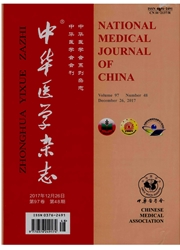

 中文摘要:
中文摘要:
目的探讨磷脂酰肌醇-3-激酶(P13K)/哺乳动物雷帕霉素靶蛋白(mTOR)双靶点抑制剂PI-103与肿瘤坏死因子相关诱导凋亡配体(TRAIL)联合应用对喉鳞癌Hep-2细胞的作用。方法将喉癌Hep-2细胞分为7组,分别为P13K抑制剂LY294002组、mTOR抑制分子雷帕霉素组、P13K/mTOR双靶点抑制剂PI-103组、LY294002+TRAIL组、雷帕霉素+TRAIL组、PI-103+TRAIL组和阴性对照组,以流式细胞仪检测各组Hep-2细胞周期及凋亡率。设立PI-103组、PI-103+TRAIL组和阴性对照组,Transwell检测各组对Hep.2细胞迁移及侵袭能力影响,Western印迹法检测各组细胞中细胞凋亡及P13K/蛋白激酶B(AKT)/mTOR信号通路相关蛋白的表达水平。结果PI-103+TRAIL组能够阻滞细胞周期于s期[G1:(1.80±0.30)%;G2:0.00],相比其他各组能显著抑制细胞分裂,增强细胞凋亡[(66.78±2.93)%](均P〈0.05)。PI-103+TRAIL组细胞迁移数和侵袭数分别为(17.0±3.4)个和(18.4±5.4)个,PI.103组为(41.2±3.8)个和(41.6±4.7)个,联合用药组可显著降低细胞迁移及侵袭能力(均P〈0.05)。与对照组相比,PI.103处理组、PI-103+TRAIL处理组半胱氨酸天冬氨酸蛋白酶(Caspase)-9、8、3的表达量逐渐升高,细胞周期蛋白(Cyclin)D1、CyclinE1、p-AKT、磷酸化真核翻译起始因子4E结合蛋白1(p-4E—BP1)的表达量逐渐降低(均P〈0.05)。结论PI-103与TRAIL联合应用于喉鳞癌Hep-2细胞能显著增强抗瘤效果,有望应用于喉鳞癌的治疗。
 英文摘要:
英文摘要:
Objective To investigate the mammalian target of rapamycin (mTOR) inhibitor, effects of a dual phosphoinosmde-3-kinase (PI3K)/ PI-103, cooperating with tumor necrosis factor-related apoptosis-indueing ligand (TRAIL) on the laryngeal squamous carcinoma Hep-2 cells. Methods Hep-2 cells were divided into 7 groups : LY294002 group, Rapamyein group, PI-103 group, LY294002 + TRAIL group, Rapamycin + TRAIL group, PI-103 + TRAIL group and control group. The cell cycle and apoptosis of Hep-2 cells were assessed by flow eytometry. For PI-103 group, PI-103 + TRAIL group and control group, migration and invasion ability were measured by transwell migration and invasion assay respectively. The expression of relative proteins in apoptosis and PI3K/AKT/mTOR signal pathway was examined by Western blotting. Results Combination of PI-103 and TRAIL could make cell cycle arrest at S phase ( G1 : 1.80% + 0. 30% ;G2:0. 00), inhibit cell proliferation, and enhance apoptosis (66. 78% ± 2. 93% ) (P 〈0. 05). Combination of PI-103 and TRAIL could statistically decrease the migration and invasion number of Hep-2 cells ( 17.0 ± 3.4, 18.4 ± 5.4) than that of PI-103 group (41.2 ± 3.8, 41.6 ± 4. 7 ). PI-103 could inhibit PI3K/AKT/mTOR signal pathway by decreasing the protein expression of p-AKT and p-4E-BP1. Comparing with the control group, the expression of eysteinyl aspartate specific proteinase (Caspase) 9, 8, 3 were increased while the expression of Cyelin D1, Cyclin E1, p-AKT, p-4E-BP1 were decreased in PI-103 and PI-103 + TRAIL group ( P 〈 0. 05 ). Conclusion Enhanced anti-tumor effects was observed by combination of PI-103 and TRAIL on laryngeal cancer cells in vitro and this combined administration might be a promising strategy for clinical treatment of laryngeal cancer.
 同期刊论文项目
同期刊论文项目
 同项目期刊论文
同项目期刊论文
 Potent Retro-Inverso D-peptide for Simultaneous Targeting Angiogenic Blood Vasculature and Tumor Cel
Potent Retro-Inverso D-peptide for Simultaneous Targeting Angiogenic Blood Vasculature and Tumor Cel 期刊信息
期刊信息
